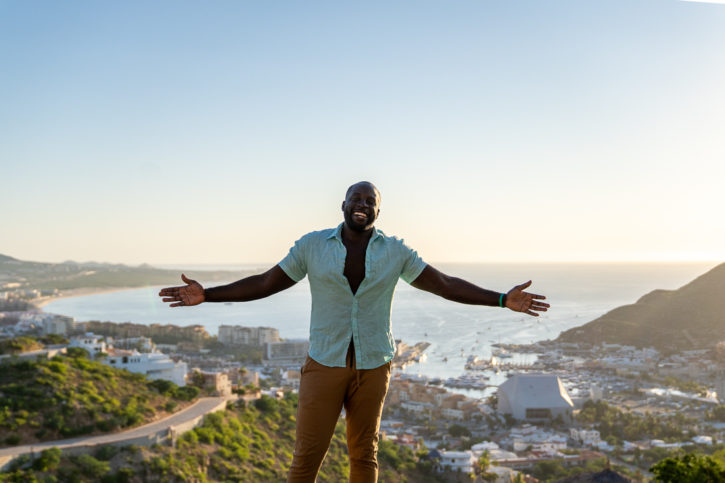When the COVID-19 pandemic shook the world, the benefits of remote work became clearer than ever. More and more travel lovers were looking to find ways to make a living while traveling full-time. Digital marketing entrepreneur Jubril Agoro, however, has spent the last 11 years doing just that.
The 34-year-old pioneer digital nomad was raised in Chicago by a single mother who pushed him towards a traditional college education.
“My mom saw that as the only way to success,” Agoro told Travel Noire. “But, during my teenage years, I saw the internet as a way of the future.”
Jubril began learning the ins and outs of digital marketing on his own while experiencing backlash from friends and family who believed the internet was a fad.
“They told me I needed to get a real job. I looked at their lives and saw that it was nothing that I wanted, so I was willing to fail to live the life that I wanted. Being really into personal development and bettering my mind, I was able to overcome self-doubt and ignore the naysayers.”

Almost two decades later, Jubril is the owner of multiple successful brands that collectively yield $15 million a year.
He is the founder of Agoro Marketing, which teaches businesses how to run creative marketing campaigns, and Passport Heavy, a travel/video production company, and one of the most influential travel channels on YouTube. He is also the co-founder of the Live Richer Academy, an online financial education platform.
Jubril made the decision to live a nomadic life after having an epiphany in Hawaii in 2010. It was February and his two-week trip to Hawaii was about to come to an end. With his flight home just four hours away, he was not looking forward to going back to snowy Chicago.
“I was working online, so I asked myself ‘Why am I heading back home? Is it because it’s what I’m supposed to do? I work from my laptop!’ At that moment, I decided that I wasn’t going back home, and that I was going to keep traveling.”

Since then, Jubril has been traveling the world while running his businesses. He enjoys his lifestyle, and says as a Black man living globally, he feels free, safe, and liberated.
“My experiences differ in other countries in that people are typically curious and intrigued with an open mind learning about Black people versus having an instantaneous judgement. I find that people are more open-minded and more often judge you on your character as opposed to their preconceived notions.”
Jubril advises people seeking to make a living while traveling full-time to look into digital nomad hotspots like Bali, Indonesia; Chiang Mai, Thailand; Tulum, Mexico; and Medellin, Colombia. These places offer affordable living and a high quality of life.
It is the low cost of living, great internet connection, safety, medical facilities, and transportation infrastructure that make these locations ideal for digital nomads.

“I’ll do a quick cost comparison. A nice one-bedroom apartment in Chicago is about $2,800 a month. Something comparable in Chiang Mai would be about $400 USD a month. To rent a motorcycle in Chiang Mai is about $150 a month.”
“If you’re into partying, you can pop a bottle of Jack Daniels in the club in Chiang Mai for $35 versus in Chicago, where it would cost you about $300. So whether you want to work all day, or work and party, the cost of living will allow you to do either.”
Jubril also recommends budgeting before jumping into a lifestyle as a digital nomad. He suggests having at least six months of living expenses saved up before traveling to a new destination.
“In a place like Chiang Mai, six months of living expenses is about $6,000, compared to Chicago, where it may be about $30,000.”

Having taken the leap to become a digital nomad 11 years ago, Jubril says there has been no better time than now for people to do so.
“Even though I’m an entrepreneur, the biggest growing class of digital nomads are people working jobs. So look into careers that allow you to work remotely. Find a community. There are different groups on Facebook where you can connect with people.”
“It’s different now than it was 11 years ago when I started traveling nonstop. Social media was less advanced and there weren’t any videos I could watch to guide me. I just had to figure it out and learn as I went along. This is the reason I created content on YouTube to help others.”
You can check out Jubril’s travel content on the Passport Heavy YouTube channel and follow him at @jubril8.
Related: 6 Digital Nomad Visa Programs You Should Know About In The Caribbean
